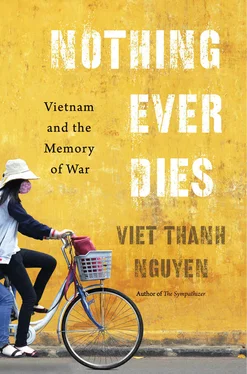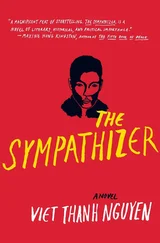How can ghosts be called on not to propitiate them and send them back to the otherworld, leaving us to our human existence, but to live in the present and to animate our memories with an inhumanity that reminds us of our own? Unsurprisingly, the authors that eschew implicit affirmations of America write from the margins of the literary industry, published by university or small presses rather than major trade houses. Feminist theorist and filmmaker Trinh T. Minh-ha, for example, has focused relentlessly on foregrounding the illusory power in having a voice. Her best-known work, the documentary Surname Viet, Given Name Nam , features the words of Vietnamese women who were interviewed about their wartime and postwar experiences. In the first half of the documentary, actresses perform those words in the guise of those women, while the second half focuses on the actresses in their lives off camera. The documentary shows that these women are actresses and not the actual women in order to demonstrate that the stories of Vietnamese women are performances, not historical fact. Trinh’s book Woman Native Other elaborates her suspicion about the seductiveness of authentic voices. She points out how, for women of color, writing is an act of privilege tainted by the guilt of being dependent on other women’s labor, or speaking for other women. 33Writing should be a form of liberation for the writer and for all women, instead of only a form that seizes the stories of women who cannot tell their own. To enact this liberation, Trinh does not rely on singular notions of ethnic identity in service of a literary industry, in being only Vietnamese, but instead reaches for solidarity with women of color, drawing on their writings and emphasizing how there is a “Third World in the first, and vice versa.” 34
Following that insight, Linh Dinh’s Love like Hate is raw, sometimes rough, always impolite, as he depicts, satirizes, and criticizes both Vietnam and America unrelentingly. “Saigon is often squalid but it is never desolate,” he writes. “Vietnam is a disaster, agreed, but it is a socialized disaster, whereas America is — for many people, natives or not — a solitary nightmare.” 35This double-edged writing cuts both ways in order to slice open the ethnic box, refusing to affirm either of the nations or their platitudes, as a more radical Vietnamese American or ethnic literature should. The poet Cathy Park Hong points to how minority poetry faces the exact same problems outlined here for Vietnamese American writers, caught between the mainstream and the avant-garde:
Mainstream poetry is rather pernicious in awarding quietist minority poets who assuage quasi-white liberal guilt rather than challenge it. They prefer their poets to praise rather than excoriate, to write sanitized, easily understood personal lyrics on family and ancestry rather than make sweeping institutional critiques. But the avant-gardists prefer their poets of color to be quietest as well, paying attention to poems where race — through subject and form — is incidental, preferably invisible, or at the very least, buried. 36
Hong insists on the inescapable importance of race in poetry. How can an author address that importance? Instead of simply being caught between two worlds, or reveling in the wondrous fusion of two cultures, as the literary industry typically expects of ethnic literature, what can a more radical literature do?

One way to dispense with the ethnic is to engage in comparison and contrast across borders, illuminating the cross-border operations of power and its abuse, greed and its operations. Another way is to reveal the disturbing universality of a shared inhumanity, rather than only the heartwarming cliché of a shared humanity. Dinh’s writing carries out both of these strategies. His voice is abrasive and caustic, and his stereoscopic vision of his two countries is sordid, sad, and suicidal. While ethnic literature often turns to digestible metaphors of food and hybrid cuisine, and if reviewers of ethnic literature often do the same, a reader of Dinh’s writing would benefit more from the dirty metaphors of parallel roads — the raucous, lawless streets of Saigon, or the underpasses and sidewalks of America. This is where he finds evidence of the inhumanity of humanity, as recorded in his blog, Postcards from the End of America , devoted in his words and photographs to the mundane horror of the American present: the wretched and the poor, the ugly with their bad teeth and unkempt hair, reeking of failure and ignominy, ghost-like because we are both afraid of them and refuse to see them at the same time. 37
A radical literature that strives against the ethnic can also turn with great passion and righteous indignation to American landscapes populated by refugees and ghosts, where “riot is the language of the unheard,” the threatening voice that ethnic literature so often softens. 38This threatening voice is heard loudly in poet Bao Phi’s Sông I Sing , where he mixes lyricism with obscenity. His subjects of war, racism, and poverty are obscene, but his other subjects of refugees, people of color, and the working class are deserving of lyrical treatment. In his “refugeography,” war delivers the refugee to America, where the refugee will encounter another, if subdued, war on the poor in the inner cities and dead zones of a necropolitical regime. 39Of Vietnamese refugees rendered homeless once again by Hurricane Katrina, he writes that “It’s like this country only allows us one grief at a time. Your people, you had that war thing. That’s all you get. Shut. The fuck. Up.” 40His grief and rage are aimed not only outward toward America but inward toward those who have absorbed the racism and class warfare directed at them, internalizing it and siding with the powerful. What happens, then,
When you can no longer tell
if you’re liberating yourself through expression
or selling your oppression. 41
This challenge can be leveled at any ethnic author in America. This author should be rightfully paranoid about being caught in so-called ethnic literature’s defining dilemma, which is to talk about only one thing, the one grief that can be possessed, worn, and hawked. While the literary industry sees the ability to tell one’s story with one’s own voice as a sign of humanity, it is also the mark of inhumanity, as both the ethnic author and the ethnic story become commodities, sold and sold out.
Can a writer do more than intuit the problems in having a voice and speaking of one’s victimization? Trinh T. Minh-ha shows us one way, gesturing at the importance of suspicion (toward authenticity and voice) and solidarity (between women, natives, and others). Linh Dinh and Bao Phi show us another, pointing toward the simultaneity of the human and inhuman. Some other writers who are not Vietnamese provide a third way, invoking Vietnam and sharing their grief and rage, which helps to overcome the oppressor’s divide-and-conquer strategy. Here James Baldwin speaks of the Black Panthers, the Viet Cong, and America:
Nothing more thoroughly reveals the actual intentions of this country, domestically and globally, than the ferocity of the repression, the storm of fire and blood which the Panthers have been forced to undergo merely for declaring themselves as men — men who want ‘land, bread, housing, education, clothing, justice, and peace.’ The Panthers thus became the native Vietcong, the ghetto became the village in which the Vietcong were hidden, and in the ensuing search and destroy operations, everyone in the village became suspect. 42
Baldwin neither denies nor bemoans the histories of war and slavery that define the Vietnamese and African Americans in American eyes. He does not simply inhabit the history given to him as a black man. He connects those histories, bringing two different spaces together so that the exercise of American power over there becomes the logical extension of American power over here — the Third World within the First, and vice versa. Victimization is not a lonely experience but is shared, which is a point that Susan Sontag also makes when she criticizes how many victims privilege their suffering: “victims are interested in the representation of their own sufferings. But they want the suffering to be seen as unique.” 43Even more, “it is intolerable to have one’s own suffering twinned with anybody else’s.” 44Sontag and Baldwin agree that victimization must be seen as more than an isolated or unique experience. Suffering can become solidarity through political consciousness and simultaneous revolution, the only ways for the natives over there and over here to confront the global force of the American war machine. First the natives of a particular place must learn that they are not the only ones victimized, that there are others who share their grief; then they have to stop identifying themselves as only victims.
Читать дальше













